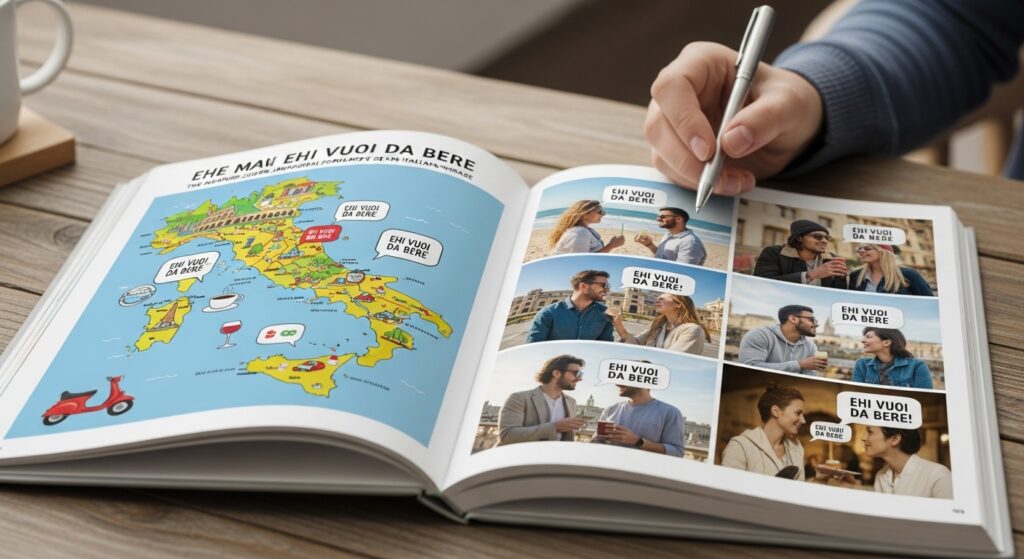The phrase “Ehi Vuoi Da Bere” translates to “Hey, do you want a drink?” in English. It’s a friendly and inviting Italian expression often used in casual or social settings. In Italy, offering someone a drink is not merely a gesture of hospitality — it represents warmth, openness, and the joy of connecting with others. Whether it’s a glass of wine, a cup of coffee, or a refreshing soda, this phrase carries emotional and cultural depth.
This article explores the linguistic background, cultural influence, and even the advertising legacy of Ehi Vuoi Da Bere, showing how such a simple phrase has transcended language barriers to become a universal expression of friendliness.
The Meaning Behind Ehi Vuoi Da Bere
At its core, Ehi Vuoi Da Bere is a casual invitation — a small but powerful way to show friendliness and inclusion. Italians are known for their hospitality and passion for food and drink, and this phrase perfectly captures that spirit.
| Italian Phrase | English Translation | Usage Context |
|---|---|---|
| Ehi Vuoi Da Bere | Hey, do you want a drink? | Used in casual, friendly settings |
| Vuoi Qualcosa Da Bere? | Would you like something to drink? | More polite or formal situations |
| Ti Offro Da Bere | I’ll buy you a drink | Used among friends or during celebrations |
This table shows how different versions of Ehi Vuoi Da Bere can be used depending on tone and familiarity. The phrase is informal yet welcoming — ideal for building friendly connections.
The Cultural Significance of Ehi Vuoi Da Bere
Italian Social Culture
In Italy, drinks are more than beverages — they’re experiences. Whether it’s espresso at a café or aperitivo at sunset, sharing a drink creates conversation and connection. Saying Ehi Vuoi Da is like saying, “Join me, let’s share a moment.”
This cultural habit emphasizes relationships over transactions. Italians take time to enjoy their drinks, often accompanied by laughter, gestures, and stories. Thus, Ehi Vuoi Da Bere becomes a gateway to social bonding.
Advertising and Pop Culture
Interestingly, the phrase Ehi Vuoi Da became famous in the 1980s through an Italian Coca-Cola commercial. The catchy jingle and friendly tone turned it into a national slogan. It resonated with young audiences, symbolizing friendship, freshness, and the simple joy of offering someone a Coke.
That campaign’s success made Ehi Vuoi Da not just a question but a cultural icon — a phrase remembered across generations. Even today, it evokes nostalgia and warmth for those who grew up hearing it on TV.
Linguistic Breakdown of Ehi Vuoi Da Bere
Understanding each word of the phrase helps appreciate its simplicity and charm:
| Word | Translation | Meaning |
|---|---|---|
| Ehi | Hey | A casual way to get someone’s attention |
| Vuoi | You want | Derived from the verb volere (to want) |
| Da Bere | To drink | Refers to a drink or beverage |
When combined, Ehi Vuoi Da literally means “Hey, you want something to drink?” but culturally it implies friendliness, approachability, and generosity.
Ehi Vuoi Da Bere and Modern Communication
From Face-to-Face to Online Use
With social media and digital culture evolving, phrases like Ehi Vuoi Da have found their way into memes, chat messages, and videos. It’s now used humorously or playfully in digital conversations, often paired with emojis or to express friendliness.
For example, on Instagram or TikTok, people may post a photo with a drink and caption it “Ehi Vuoi Da ?” to invite virtual connection. The phrase has become timeless — fitting both in real cafés and in the digital world.
The Emotional Power of Simplicity
In a world where communication can be complex and impersonal, simple phrases like Ehi Vuoi Da remind us of human warmth. It’s not just about offering a beverage — it’s about sharing time, emotion, and goodwill. That’s why this short sentence continues to resonate even decades after its first use in Italian ads.
How Ehi Vuoi Da Bere Reflects Italian Hospitality
Hospitality in Italy is about inclusivity. When an Italian says Ehi Vuoi Da , they’re extending more than an offer — they’re inviting you into their world. This phrase carries elements of trust, comfort, and friendship.
| Scenario | Meaning of “Ehi Vuoi Da Bere” | Common Drinks Offered |
|---|---|---|
| Casual meet-up | Friendly invitation | Espresso, cappuccino |
| Evening gathering | Celebration or relaxation | Wine, cocktails |
| Summer afternoon | Refreshment gesture | Soda, lemonade |
This table highlights that the type of drink isn’t what matters most — it’s the gesture of offering that builds connection.
Global Appeal of Ehi Vuoi Da Bere
Even non-Italian speakers find charm in the phrase Ehi Vuoi Da . Its rhythm, warmth, and universality make it appealing across cultures. Brands and influencers use it to express hospitality or playful invitation, showing how language can bridge cultural gaps.
In tourism, Italian restaurants and cafés worldwide often use this phrase on menus, posters, or social media to create an authentic Italian atmosphere. It reflects the country’s relaxed, social lifestyle — where every drink is a reason to celebrate togetherness.
The Psychology Behind Ehi Vuoi Da Bere
There’s a deeper psychological layer to this phrase. Offering someone a drink fulfills two key human needs — social belonging and mutual respect. Psychologists note that small gestures of sharing, like saying Ehi Vuoi Bere, trigger positive emotional responses.
This explains why the Coca-Cola campaign became iconic — it connected emotionally with people by using a simple, relatable phrase. It appealed to our instinct for connection and kindness, turning everyday words into something memorable.
Ehi Vuoi Da Bere in Modern Marketing
Even today, marketers recognize the emotional pull of Ehi Vuoi Da . Modern campaigns inspired by this phrase use similar tones — casual, inclusive, and warm.
For instance:
-
Beverage brands use it to emphasize friendship and freshness.
-
Cafés and bars use it to make customers feel personally invited.
-
Tourism campaigns use it to symbolize Italian lifestyle and charm.
In short, Ehi Vuoi Da continues to inspire marketing strategies because it feels real and human.
The Enduring Legacy of Ehi Vuoi Da Bere
Decades after its rise to fame, the phrase remains embedded in Italian pop culture. It’s a reminder that small, genuine gestures can leave lasting impressions. Whether it’s a coffee shared between friends or a drink offered to a stranger, the spirit of Ehi Vuoi Da endures — welcoming, friendly, and full of life.
Conclusion
Ehi Vuoi Da is more than just an Italian phrase — it’s a cultural symbol of warmth, friendship, and generosity. It captures the essence of Italian hospitality, reminding us that sometimes, a simple offer can build powerful connections.
From its linguistic charm to its global appeal, Ehi Vuoi Da proves that language can unite people through shared human experiences. So, next time you meet someone new or catch up with a friend, remember the phrase — Ehi Vuoi Da ? — and celebrate the joy of sharing something as simple, yet meaningful, as a drink.







